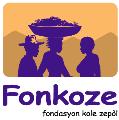New Partnership Launched to Promote Entrepeneurship, Fight Disease
 At the recent Clinton Global Initiative meeting, Fonkoze, BRAC, BRAC USA, Partners In Health, CGAP, and CHF announced a partnership in which they would contribute $50 million towards a two-year effort to improve health and reduce poverty in Central Haiti. The initiative will target 575,000 people on Haiti's Central Plateau and will do what all development programs should be doing...helping people to help themselves.
At the recent Clinton Global Initiative meeting, Fonkoze, BRAC, BRAC USA, Partners In Health, CGAP, and CHF announced a partnership in which they would contribute $50 million towards a two-year effort to improve health and reduce poverty in Central Haiti. The initiative will target 575,000 people on Haiti's Central Plateau and will do what all development programs should be doing...helping people to help themselves.
The major components of this commitment involve building:
1) Safety nets with transitions to sustainable enterprise for the most vulnerable;
2) Comprehensive health services;
3) Food security and agricultural training and employment;
4) Improved water access and sanitation; and
5) Youth leadership development and training
“Bringing together our combined successes and expertise in a comprehensive economic, health, and leadership development approach is the precise, direct strategy needed at this crucial time,” said Anne Hastings, Director of Fonkoze. “We all seek to build a sustainable future for Haiti and her people.” The Inter-American Development Bank (IDB) recently recognized Anne Hastings for her efforts to increase access to microfinance in Haiti. More information about Fonkoze and the other partners involved in this important initiative are available below.
Fonkoze is Haiti’s largest micro-finance organization with a mission to build the economic foundation for democracy in Haiti by providing the rural poor – mostly women – with the tools they need to lift themselves out of poverty. Fonkoze is national in scope with more than 40 branches throughout Haiti offering a full range of financial services to the rural-based poor, currently reaching more then 225,000 savers and borrowers. To learn more about Fonkoze visit www.fonkoze.org
Zanmi Lasante, the Haitian sister organization of the U.S.-based NGO Partners In Health, is one of Haiti’s largest health care providers, serving a catchment area of 1.2 million in Central Haiti and the lower Artibonite Department. Zanmi Lasante has been working for more then two decades in Haiti to increase access to a full range of high-quality health services and to lift entire communities out of poverty through a range of social support and community development. To learn more about Partners in Health visit www.pih.org.
BRAC/BRAC USA BRAC, the largest non-profit in the developing world, was launched in Bangladesh in 1972 and currently touches the lives of more than 110 million people through its programs addressing poverty including micro-loans, education, health services, self-employment opportunities and human rights education. BRAC’s vision is to improve the health, wealth and well being of millions of the poorest families primarily in Asia and Africa. BRAC has provided $5 billion in micro-loans to nearly seven million borrowers, mostly women, and created 8.5 million self-employment opportunities. BRAC’s 73,000 community health promoters have provided basic health services to more than 93 million people. To learn more about BRAC, please visit www.bracusa.org
CGAP, the Consultative Group to Assist the Poor is a consortium of 33 public and private development agencies working together to expand access to financial services for the poor in developing countries. CGAP was created in 1995 by aid agencies and industry leaders to help create permanent financial services for the poor on a large scale (often referred to as microfinance). To learn more about CGAP visit www.cgap.org. CHF partners in rural development (former Canadian Hunger Foundation) CHF partners in rural development is a non-profit organization dedicated to enable poor rural communities in developing countries to attain sustainable livelihoods. To Learn more about CHF Partners in Rural Development visit www.chf-partners.ca.
Linked Foundation invests in leading organizaitons to create high-impact solutions in improving the health and economic self-reliance of underserved women in the U.S. and Latin American. To learn more about Linked Foundation visit www.linkedfoundation.org.
Add new comment